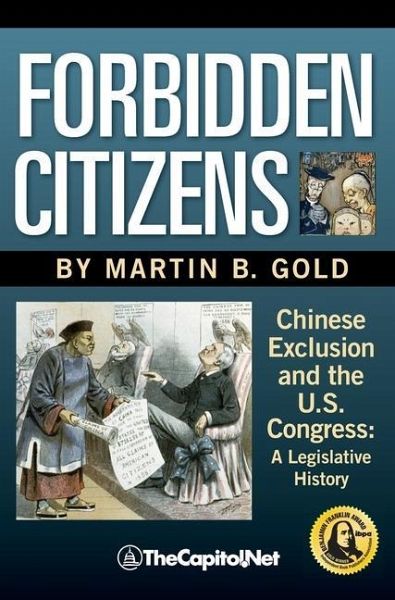
Forbidden Citizens
Chinese Exclusion and the U.S. Congress: A Legislative History
Versandkostenfrei!
Versandfertig in über 4 Wochen
41,99 €
inkl. MwSt.
Weitere Ausgaben:

PAYBACK Punkte
21 °P sammeln!
"Highly recommended. Lower-division undergraduates though faculty." -- CHOICE "[L]andmark volume on the subject of exclusionary policies against Chinese and Chinese Americans ... a valuable teaching tool ... an exemplary subject reference." -- Library Journal Named an Honor Book by the Asian and Pacific American Librarians Association (APALA), and a Gold Winner of the Benjamin Franklin Award. A whole class of people, forbidden from ever becoming citizens . . . forbidden from even entering the country-their rights torn up and trampled on, left with no political redress. This was the United Stat...
"Highly recommended. Lower-division undergraduates though faculty." -- CHOICE "[L]andmark volume on the subject of exclusionary policies against Chinese and Chinese Americans ... a valuable teaching tool ... an exemplary subject reference." -- Library Journal Named an Honor Book by the Asian and Pacific American Librarians Association (APALA), and a Gold Winner of the Benjamin Franklin Award. A whole class of people, forbidden from ever becoming citizens . . . forbidden from even entering the country-their rights torn up and trampled on, left with no political redress. This was the United States of America from 1882 through 1943-if you had the misfortune to be Chinese. The United States Congress banned all Chinese from becoming U.S. citizens from 1882 through 1943, and stopped most Chinese from even entering the country starting in 1882. Forbidden Citizens recounts this long and shameful legislative history. Congress passed restrictive legislation between 1879 and 1904. The most notorious was the Chinese Exclusion Act of 1882, described as "one of the most vulgar forms of barbarism," by Rep. John Kasson (R-IA) in 1882. These laws were targeted not only at immigration, they banned citizenship, even for legal immigrants who had arrived before the gate was closed in 1882. Barred from becoming voters, the Chinese had no political recourse against repeated discrimination. Because their appearance and lifestyle were so different, it was easy to tyrannize the Chinese. Insisting that the Chinese could not assimilate into American culture, lawmakers actively blocked them from doing so. Democrats and Republicans alike found the Chinese easy prey. For the first time, this book assembles the complete legislative history of Congress's Chinese exclusion. "Our nation has the greatest ideals, standing as that 'city upon a hill' for the world over to look toward with hope. Yet we have not always been as welcoming as we have proclaimed. Forbidden Citizens by Martin Gold tells the story of the exclusion of a specific group, the Chinese people, for racial reasons that were expressed in the most shocking terms. It is thorough, thoughtful, and highly relevant today. This work presents the best scholarship in the most accessible manner." -- Frank H. Wu, Chancellor & Dean, University of California Hastings College of the Law "Through engaging narrative, Forbidden Citizens expertly tells a story unfamiliar to most Americans, one that left a permanent scar upon the psyche of Chinese Americans and changed our nation forever. Martin Gold's thorough and pioneering research into decades of Congressional history brings to life the politics of Chinese exclusion in a way no one has." -- Judy Chu, United States Representative (D-CA) "Forbidden Citizens is a moving account of a regrettable part of American history. Marty Gold has done us all a service by bringing this story to light so that our past mistakes are never repeated." -- Scott Brown, United States Senator (R-MA) "An important piece of scholarship, which vividly depicts the intensity of anti-Chinese and anti-Asian feeling that was widespread even among our intellectual and political elite only a century ago." -- Stephen Hsu, Professor of Physics, University of Oregon For Complete Table of Contents, see ForbiddenCitizens.com


